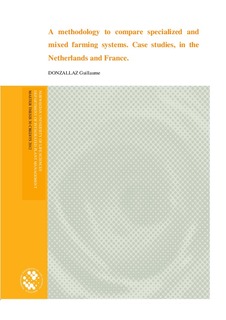A methodology to compare specialized and mixed farming systems. Case studies, in the Netherlands and France.
Master thesis
Permanent lenke
http://hdl.handle.net/11250/189488Utgivelsesdato
2012-11-09Metadata
Vis full innførselSamlinger
- Master's theses (IPM) [204]
Sammendrag
This master thesis was carried out at Plant Research International in Wageningen, the Netherlands, within the framework of the double degree in Agroecology between ISARA-Lyon in France and UMB in Norway. The study was part of the CANTOGETHER project. Standing for Crops and ANimals TOGETHER, this European project aims at promoting innovative mixed farming systems in several case studies of Europe. In this thesis, the aim was to create a methodology, composed of a set of economic, social and environmental indicators, in order to compare mixed and specialized farming system and to test the methodology in two case studies in the Netherlands and in France. The analysis relies on two farm typologies based on the concepts of representative and typical farms. Accordingly, the two-scale methodology uses the farm accountancy data network (FADN) to compare farming systems over large areas and agri-environmental data collected on-farm to design innovative farming systems. The results are a first step towards understanding up scaling procedure of innovative mixed farming systems at district level. While the municipality of Winterswijk shows a higher potential to develop between-farm mixing, the Ribéracois however presents better possibilities to develop diversified on-farm mixing. Very heterogeneous areas of Europe render difficult to set up a harmonized methodology. The data heterogeneity of case studies and the importance to make good use of existing information and specificities of each case study prevails on harmonizing the set of indicators. The scientific soundness and efficacy of the methodology is empirically verified but further study is needed to validate all indicators. Additionally, a selection of a primary set of information that is required by all work packages and all case studies is necessary to have a common basis for work.
